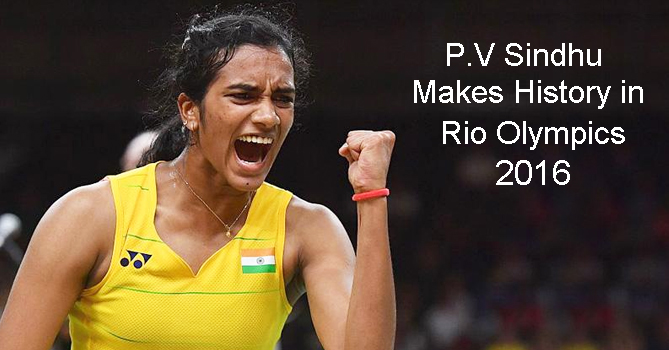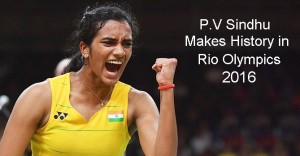In PV Sindhu, India has produced its first female champion to win a Silver medal at the Olympics and it happened in Rio 2016! “I am on Cloud Nine,” she exulted soon after her stunning performance in the final of women’s Badminton, where she stretched the existing World Champion, Carolina Marin of Spain, before going down fighting.
In her defeat, India gave birth to a new star, one who is sure to inspire the next generation to take up competitive sport, and in her hard fought Silver medal lies the ‘silver lining’ for India.
PV Sindhu’s path to finals
The run up to the finals wasn’t easy for World No. 10 Sindhu, as she had to start her campaign in a tough group. Her opening match was with Laura Sarosi of Hungary, who she comfortably beat 21-8; 21-9, in a match that lasted just 29 minutes.
Her next match was with World No. 20, Michelle Li of Canada, who put up a strong fight and won the first game 21-19. However, Sindhu came back fighting in the next game dominating Li with a 21-15 win. The third game, too, saw a determined Sindhu putting the squeeze on the Canadian before finishing off with a 21-17 win in the 76-minute match.
In the pre-Quarterfinal round, PV Sindhu ran into the talented Tzu Ying Tai of Chinese Taipei, who is the current World No. 8. This was seen as a tough match as Tai had beaten Sindhu before along with a host of other top ranked players. However, Sindhu’s aggression can be gauged by the fact that she crushed Tai in straight games within 42 minutes only, ending up with a flattering score of 21-13; 21-15.
Her Quarterfinal match was against World No. 2 and Olympic Silver medalist, Yihan Wang of China. This match was billed as a tough Chinese wall that PV Sindhu was going to find hard to surpass. But Sindhu wasn’t in a mood to be overawed. She had beaten the best on her day and she knew if she could hold her nerve against the Chinese champion, she had a good chance.
And she did exactly that. In a closely fought fast paced match that lasted 55 minutes, Sindhu held her own, fending off aggressive play by Wang, to end up winning 22-20; 21-19. Sindhu had created history for herself by entering the semifinal round at an Olympics for the first time.
She now had World No. 6 Nozomi Okuhara of Japan standing between her and her first Olympic medal. Sindhu realized that it will be this match standing between her and history and she was determined not to let go her golden run thus far.
The opening game against Okuhara was a hard one, with the Japanese giving back everything that Sindhu could throw at her. But Sindhu hung on winning the first game 21-19. The second game saw an unusually aggressive Sindhu come out all guns blazing, and the tsunami of aggressive play left the World No. 6 gasping for breath. She lost 10-21 to Sindhu. And history was created! PV Sindhu became the first Indian female Badminton player to make it to the finals of an individual Olympic event.
With a now aroused and excited nation of a billion plus enthusiasts rooting for her, Sindhu was all set to go for the kill.
Her final match at Rio was going to be her toughest, as she took on reigning World No. 1. Carolina Marin of Spain. This match was going to be a cracker. Marin had her No. 1 position to justify, while Sindhu was hoping to become the giant slayer creating history, like no other Indian player had done before at the Olympics.
The entire nation went into a frenzy when Sindhu took the first game 21-19, something that left the World No. 1 stunned. Marin had to pull out her best to come back aggressively in the second game to completely dominate the Indian player. She was helped by a string of unforced errors by Sindhu that resulted in Marin taking an unassailable lead and finally winning the second game 21-12 to make it 1-1.
Sindhu was not willing to let go the opportunity, but started off badly with a string of errors, letting Marin take a 5-1 lead very quickly. But fighter that she is, Sindhu took her match a notch above to end the first part of the 3rd and final game at 10-11, behind Marin.
In the final phase of the last game at one point, Sindhu had the lead giving a tense nation a glimmer of hope that she may just about pull it off but Marin brought her years of experience, using her dexterous wrists to unleash a series of cross-court smashes to outscore Sindhu to the Gold. She won 21-15, but the score doesn’t reflect the spirit with which Sindhu stretched the champion.
Sindhu has taken the Silver medal, but in her defeat she has now ignited the fire in the next generation that will now want to follow her path. This victory is great by any standards but certainly not the last for PV Sindhu.
She is just 20 years of age and her best is yet to come. If she can hold on to her fitness levels, there will be no stopping her from reaching World No. 1 in the coming years. That should be enough for the next generation of young champs to take to the courts. Sindhu may have taken the Silver but the Silver lining in her victory will be savored by those who look up to her for inspiration.
A word for the Champion maker – Pullela Gopichand
The former All England winner was forced to cut short his playing career due to injury and took to coaching youngsters in an effort to stay connected to the game.
But Gopichand is no ordinary coach. He had dreams, as he had ambitions, and he was determined to live those through the youngsters who came to him for coaching. He was granted a 5-acre plot on a 45-year-lease by former CM, Chandrababu Naidu to build a Badminton coaching academy.
Short of funds, Gopichand was lucky to find a mentor in businessman, Nimmagadda Prasad, who donated Rs 5 crore to build the academy.
Today, the Pullela Gopichand Academy is recognized as a world-class coaching institution for producing the highest quality of badminton players. PV Sindhu came to Gopichand as a child, as did several other youngsters like Saina Nehwal, Kidambi Srikanth and P Kashyap, amongst a host of other names, all of whom swear by Gopichand’s commitment and coaching ability to patiently nurture talent and turn them into world beaters.
If PV Sindhu has earned her Silver medal then the coaching Gold should go to Pullela Gopichand. There is more to come from this awesome duo as the list of youngsters wanting to join his academy is set to swell exponentially. Both PV Sindhu and Gopichand have set standards for other sportspersons and coaches to follow and that can only be good news for India.
Read More:
Biography of P.V. Sindhu
Team IND at Rio Olympics: Lots of Brickbats, some Bouquets too
List of Participating Indian Athletes for Rio Paralympics 2016
Why the performance of India is so poor in Olympics?





